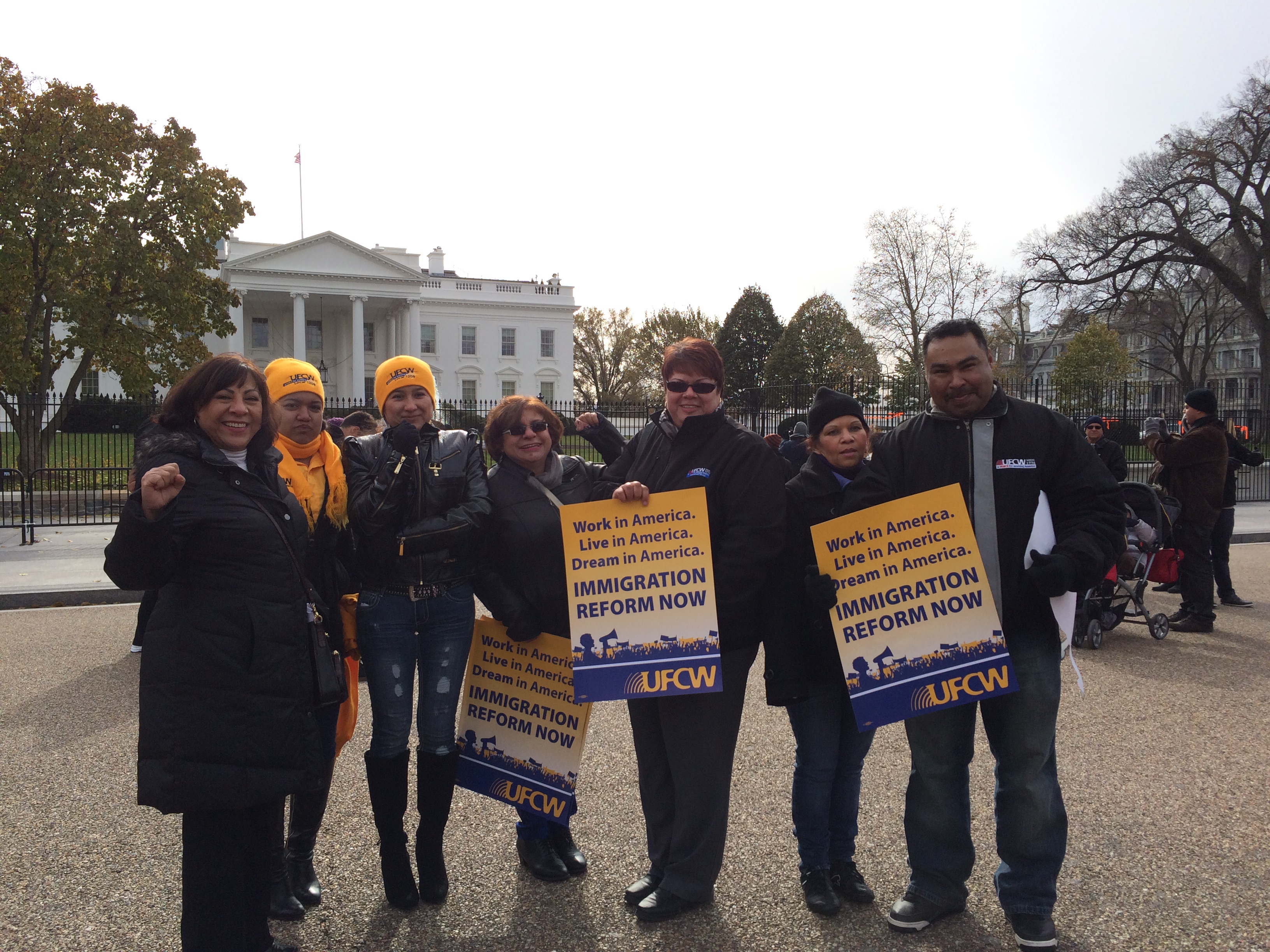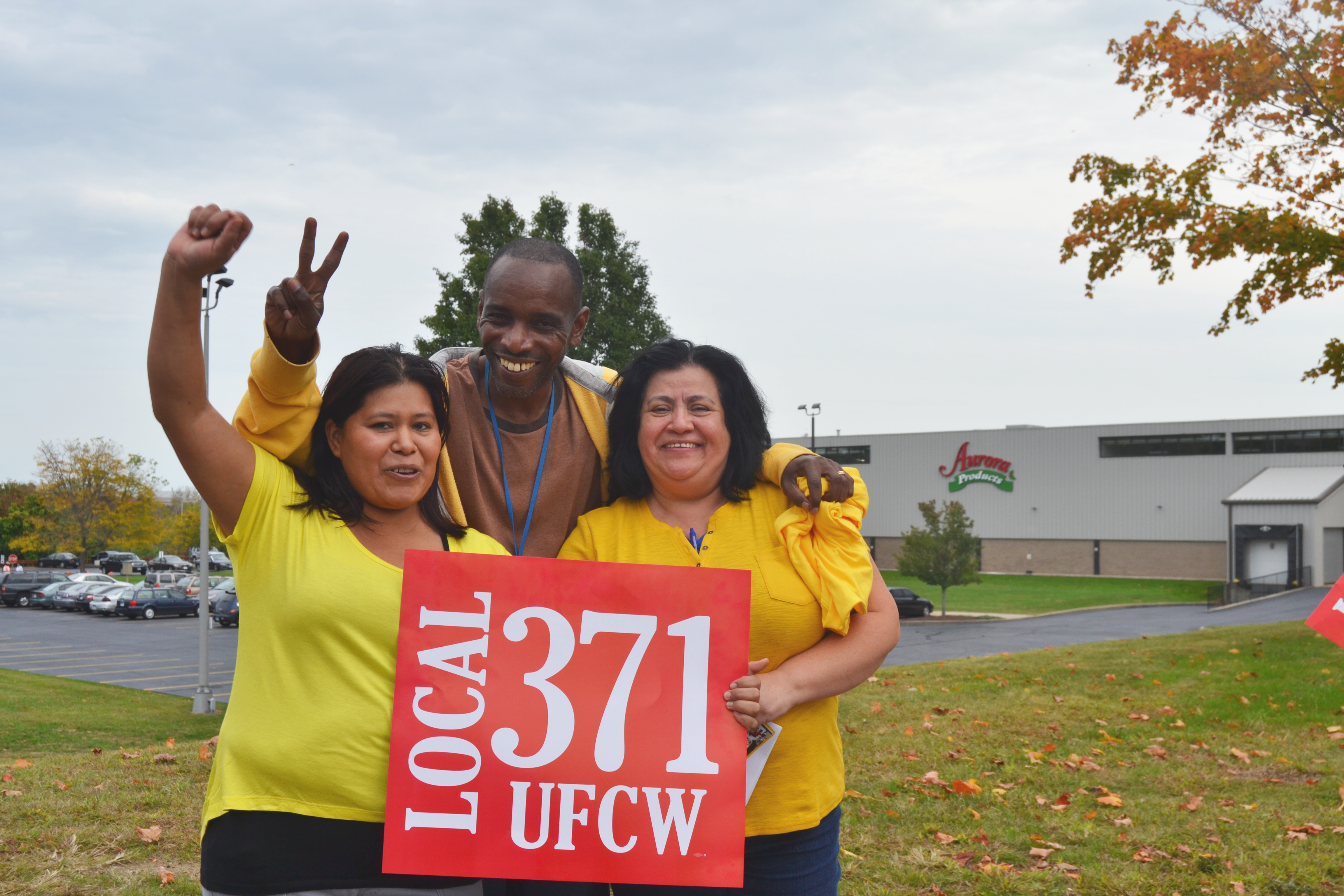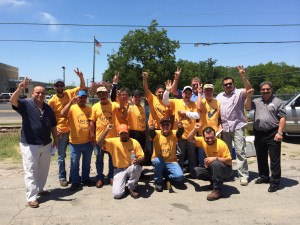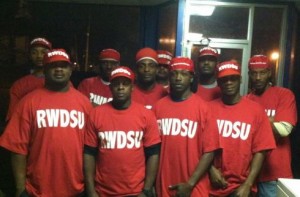November 19, 2014
Rep. Gutierrez Joins Farm Workers behind the Thanksgiving Meal to Hold Holiday Feast in front of White House
 Farm & Food Processing Workers Deliver Letters Calling for Executive Action
Farm & Food Processing Workers Deliver Letters Calling for Executive Action
See here for archived footage and other important information from today’s event.
Washington, DC—Today, on the cusp of one of America’s most celebrated holidays, Rep. Luis Gutierrez (D-IL) alongside immigrant farm, food and commercial workers from across the country gathered in front of the White House to remind Americans of the people behind the Thanksgiving meal, and express their support for President Obama taking the most inclusive executive action possible. The event shined a special spotlight on members of United Farm Workers and United Food and Commercial Workers who presented an array of Thanksgiving foods harvested and processed by immigrant workers, including a turkey, potatoes, pumpkin, and other foods commonly found on America’s Thanksgiving tables.
Said Rep. Luis Gutierrez (D-IL), “The President is going to act boldly, broadly and soon and across the country the bounty and blessings of Thanksgiving will be joyous. The President’s actions will mean that millions of American families will not fear deportation and destruction and so many people contributing to our economy, including those who pick, pack and move the food to our tables, will be able to continue helping us all live better.”
In addition to the Thanksgiving table, farm workers delivered letters from across the country, explaining why administrative relief is so important to their families and communities. Many of the letters included invitations to the President to share a Thanksgiving meal with farm workers in their homes. (View the original letters in Spanish and their English translations). One of the letters written by Jaime Sanchez, a fourth year college student and son of farm workers, appeared as an op-ed in his student paper at the University of Chicago–the President’s former place of work.
“The protracted political debates and the partial solutions offered by House Republicans that ignore the inconvenient truth that America’s food will continue to come to our tables through the toil and exploitation of undocumented farm workers who do the work that no one else is doing. Instead of a seat at our nation’s table, farm workers live in the shadows where they are subjected to inhumane working conditions, rampant sexual harassment, wage theft and the threat of deportation if they dare to stand up for their humanity,” said Arturo Rodriguez, President of United Farm Workers (UFW). “That’s why we are here at the White House today, to share with America that we support the President taking the most inclusive executive action possible. On this holiday of giving thanks, it’s time to give thanks to our Thanksgiving workers by simply extending to them meaningful action that says, ‘If you harvest our food, you’re welcome at the table.’”
Added Esther Lopez, International Vice President and Director of Civil Rights and the Community Action Department at United Food and Commercial Workers International Union, “In the face of cowardly inaction by the House Republican leadership, today we ask President Obama to do what he should have done long ago – use his clearly defined legal authority to provide relief to immigrant workers and their families. We ask the President to put in place a framework that ensures immigrant workers are treated with dignity and respect on the job.”
Their sentiments were bolstered by a chorus of farm and food workers from across the country.
Said Maria G. Lozano Ramirez, a grape harvester from Benson City, WA, “Wine is important to Thanksgiving dinner, but people drink it without thinking about how much work it takes to make that one bottle of wine. How many undocumented farm workers did it take to make it taste so good? We work long hours but without much acknowledgement.”
Pumpkin grower Maria Martha Acevedo Cardenas from Sunnyside, WA recalled the sacrifices behind every Thanksgiving meal, saying, “I’m not asking for pity, but I am asking for what’s fair. Farm workers need immigration reform. They’re able to eat the best produce, while we are unable to afford the same fruits and vegetables we picked. One day, I would like to be able to buy my own Thanksgiving turkey.”
Added her U.S. citizen daughter, Eustalia (Toy) A. Acevedo, who picks apples in Seattle, WA, “When the average American eats that apple pie or a dish with apples on Thanksgiving, they need to realize without farm workers picking their fruits or vegetables there wouldn’t be a Thanksgiving meal.”
San Juanita Marquez, a poultry processing plant worker from Lumber Bridge, NC, explained the perils of life as an undocumented worker: “If immigration comes to the plant or my house, I could be separated from my children. My youngest children are American citizens, and because I have no family here, they would be left alone and be sent to foster care if I was deported. It would be too dangerous to take them back to Guerrero where children and the elderly are gunned down in gang violence. I ask Obama to stop the deportations – let us work and let us keep our children safe.”
Maria Arteaga, harvests potatoes in Parma, ID. Several years ago she and her husband were stopped and subsequently deported for “looking suspicious” while on a road trip to Los Angeles. At the time her small children, including her daughter Areli, then 5, had stayed home with a relative while they were away. “Once I was deported, all I could think about was my children. I had to get back to them. I did what any mother would have done. I made the sacrifice and returned to the U.S. illegally.”
Added her daughter, Areli, who often helps with corn harvesting when home from college: “I want people, who don’t believe we need immigration reform to think about something before they bite into their corn on the cob: some people, unlike them, can’t be sitting at the table enjoying a Thanksgiving meal with their family because they can’t travel out of the country to see them or because their family has been deported.”
Said Inocencio Bernal Pedroza, who picks celery in Madera, CA: “Farm workers contribute to the U.S. economy, but many of them are undocumented and are not treated equally or acknowledged for their work. They provide food for American families. Americans should try to have to have their Thanksgiving meal without undocumented farm workers toiling in the fields. There would be no dinner! There’s produce in the supermarkets because farm working hands put it there.”
Alberto Bermejo, who picks peaches in Sanger, CA, said, “If we’re not in the fields picking the peaches, then they won’t be served on Thanksgiving. A little appreciation for what we do would go a long way.”
Juan and Maria Pacheco, achieved American citizenship after years of working at a turkey processing plant in Mifflintown, PA. Today they called for executive action on behalf of their undocumented coworkers. Said Juan, “Families all across the country are going to be eating our turkeys next week, but they don’t know the stories behind their Thanksgiving dinner. My wife and I worked in the Empire Kosher turkey plant for fifteen years before we finally earned American citizenship. We have worked hard to earn our American Dream. This Thanksgiving, President Obama has the chance to give that same opportunity to other hardworking families like ours.”
Additional information on today’s event, including the farm worker letters, bios, social media tools and archived footage is available here.
October 31, 2014
UFCW Applauds OSHA’S Effort to Protect Poultry Workers from Musculoskeletal Disorders, Hazardous Workplace Conditions
 WASHINGTON, D.C. — The United Food and Commercial Workers International Union (UFCW) today released the following statement regarding OSHA’s decision to exercise the seldom-used “general duty clause” of the Occupational Safety and Health Act to protect poultry workers from workplace injuries or death.
WASHINGTON, D.C. — The United Food and Commercial Workers International Union (UFCW) today released the following statement regarding OSHA’s decision to exercise the seldom-used “general duty clause” of the Occupational Safety and Health Act to protect poultry workers from workplace injuries or death.
“The UFCW applauds OSHA’s decision to use the “general duty clause” to protect poultry workers from dangerous workplace conditions, including exposure to unsafe machinery, risk of falling and musculoskeletal hazards. The UFCW also commends OSHA’s efforts to look into practices that result in the failure to manage the medical treatment of injured poultry workers and maintain an accurate record of those injuries, resulting in an artificial injury and illness rate that is used to benefit the poultry industry at the expense of the safety of its workers. The UFCW believes that the safety awards presented by the National Chicken Council and other industry groups to member poultry companies for outstanding safety performance should be reconsidered since OSHA’s findings show that the poultry industry has the ability to conceal the extent to which poultry workers suffer from work-related injuries and illnesses.
“The UFCW represents workers at poultry plants across the country, and our union has called attention to the many dangers poultry workers face every day, including ergonomic health hazards. While the UFCW has been successful in curbing some of the workplace abuses in this industry, too many poultry workers do not have a collective voice on the job and continue to toil in low-wage jobs that threaten their health and safety.
“All poultry workers deserve better workplace conditions, and the UFCW urges OSHA to establish a National Emphasis Program to protect poultry workers from the health and safety hazards that are specific to this industry.”
###
The United Food and Commercial Workers International Union (UFCW) represents more than 1.3 million workers, primarily in the retail and meatpacking, food processing and poultry industries. The UFCW protects the rights of workers and strengthens America’s middle class by fighting for health care reform, living wages, retirement security, safe working conditions and the right to unionize so that working men and women and their families can realize the American Dream. For more information about the UFCW’s effort to protect workers’ rights and strengthen America’s middle class, visit www.ufcw.org, or join our online community at www.facebook.com/UFCWinternational and www.twitter.com/ufcw.
October 9, 2014
Aurora Products Workers Win Election for Union Representation at Plant
 Orange, Conn. – On Wednesday, October 8, 175 workers at Aurora Products, a natural food processing company in Orange, Conn. voted to join the 9,000 member strong United Food and Commercial Workers Union Local 371 (UFCW Local 371) based in Westport, Conn.
Orange, Conn. – On Wednesday, October 8, 175 workers at Aurora Products, a natural food processing company in Orange, Conn. voted to join the 9,000 member strong United Food and Commercial Workers Union Local 371 (UFCW Local 371) based in Westport, Conn.
“Our votes were hard fought and won by Aurora workers who are on the line each day and concerned about the livelihoods of their coworkers. I’m happy that we can finally move forward, together,” said Ariceli Martinez, a production line worker who works at the plant.
Workers reached out to UFCW Local 371 wanting to address longstanding issues at the plant without fear of being intimidated or retaliated against.
“We are proud of the hard work and determination workers at the plant have shown throughout the past few months,” said Thomas A. Wilkinson, UFCW Local 371 President. “They reached out to us to make this happen and they saw this effort through Election Day. We have more work to do ahead and are confident that we can help workers win a contract they deserve at Aurora Products.”
Aurora Products, headquartered in Orange, Connecticut is a growing natural and organic processing plant, specializing in dried fruits, nuts, trail mixes, salad toppings, and granolas. Workers will now work with the company to come to an agreement that addresses worker concerns at the plant while helping the company grow.
“We need a chance and a voice,” said Troy Stephenson, a production line worker. “Voting together was just a first step towards making things better for our work environment, for our communities, and for our families.”
UFCW Local 371 is affiliated with the United Food and Commercial Workers International Union (UFCW), which represents more than 1.3 million workers, primarily in the retail and meatpacking, food processing and poultry industries.
September 5, 2014
Union Plus Job Loss Grant Helps UFCW Member Start Fresh
Losing a job can happen to the best of us. The challenge is to maintain your strength, your determination, your resiliency and of course your union values. Karyn Neeley of Rosamond, Calif., and United Food and Commercial Workers (UFCW) Local 1036, is making it through a tough time with her head held high and her values intact—with help from a $300 Union Plus Job Loss Grant.
Karyn spent 11 good years in UFCW, working as a meat and seafood manager and even representing her local as a steward and a vice-president. In the time since then, she’s done other work, including in the banking industry. But she’s kept her union card, as well as her Union Plus Credit Card—and that was the key to receiving her Job Loss Grant.
The Union Plus Credit Card program is uniquely designed to meet the needs of hard-working union members and their families with competitive rates, U.S.-based customer service and more.
In addition, it’s the only credit card that offers exclusive assistance programs1 to help UFCW members and their families who are facing hardship. One of those assistance programs is the Job Loss Grants of $300 for those who have carried the card for three months or more and who meet the other eligibility requirements.
“I’ve carried a Union Plus Credit Card for many years,” Karyn says. “I was opening my bill one day and in the statement there was some information about Job Loss Grants. I thought, you know what, let me try it.”
Karyn completed and submitted the application along with the other documentation required to consider her grant request. Her application was approved and soon thereafter she received her $300 check. “It was wonderful getting the Union Plus Job Loss Grant when I needed it,” she says. “I used it to pay some bills.”
These days Karyn is ready to get back into the workforce. She’s considering a number of options, including putting her training as a licensed cosmetologist to work. But if she could find the right opportunity in a supermarket, she’d jump at the chance to be in a UFCW workplace once again.
“After all my years in UFCW I know what a difference having union pay and benefits can make,” she says, “including the opportunity to carry a Union Plus Credit Card.”
Do you carry a Union Plus Credit Card? It features Disability, Job Loss, Strike and Hospital Grants for eligible cardholders1. It also features a competitive rate and all customer service calls answered in the U.S. You can learn more by visiting UFCWcard.com.
At UnionPlus.org you can learn more about these programs, as well as special services that are available to all union members and retirees.
# # #
1Certain restrictions, limitations, and qualifications apply to these grants. Additional information and eligibility criteria can be obtained at UnionPlus.org/Assistance.
Credit approval required. Terms & Conditions apply. Union Plus Credit Cards issued by Capital One, N.A.
August 25, 2014
Texas Cargill Workers Vote Union “Yes”
 Cargill workers in Fort Worth, Texas, voted to join UFCW Local 540. There are more than 200 workers at the ground beef processing plant where they produce hamburger patties and sausage. Workers decided to come together for a union voice for several reasons. Workers claim that many of their peers have been unjustly fired. And, they say verbal abuse and disrespect on the job are common. When the company threatened to cut wages, workers went into action to fight back.
Cargill workers in Fort Worth, Texas, voted to join UFCW Local 540. There are more than 200 workers at the ground beef processing plant where they produce hamburger patties and sausage. Workers decided to come together for a union voice for several reasons. Workers claim that many of their peers have been unjustly fired. And, they say verbal abuse and disrespect on the job are common. When the company threatened to cut wages, workers went into action to fight back.
With a union voice and a union contract through UFCW Local 540, workers say they are looking forward to dignity and respect on the job, good wages, and affordable benefits.
July 31, 2014
UFCW President Hansen Statement on Final USDA Poultry Modernization Rule
 WASHINGTON, D.C. — Joe Hansen, International President of the United Food and Commercial Workers International Union (UFCW), today released the following statement after the USDA published a final poultry modernization rule.
WASHINGTON, D.C. — Joe Hansen, International President of the United Food and Commercial Workers International Union (UFCW), today released the following statement after the USDA published a final poultry modernization rule.
July 21, 2014
UFCW Grand Island JBS Beef Plant Members Ratify New Five-Year Contract
 Grand Island, Nebraska – Workers at the JBS beef slaughter and processing facility in Grand Island, Nebraska, who belong to United Food and Commercial Workers Union Local 293 ratified a new contract on Thursday, July 17. The new five-year agreement will cover more than 2,600 workers and will go into effect today.
Grand Island, Nebraska – Workers at the JBS beef slaughter and processing facility in Grand Island, Nebraska, who belong to United Food and Commercial Workers Union Local 293 ratified a new contract on Thursday, July 17. The new five-year agreement will cover more than 2,600 workers and will go into effect today.
“This new contract is great for our members and the local economy,” said Dan Hoppes, President of UFCW Local 293. “Thanks to support and unity of UFCW union members from across the country, we were able to negotiate a contract that raises the bar for workers in this industry. Workers will earn higher wages and a healthcare plan that benefits workers, their families, and the company.”
The new contract will:
- Provide a $1.80 hourly increase over the course of the contract.
- A $0.60 per hour increase in the first year which will be paid retroactively to the original contract expiration date, April 27, 2014.
- Maintain affordable health care costs for employees with only minor plan changes.
- Establish a primary health care clinic in Grand Island which means flexible, easily accessible health care to JBS employees with no cost for primary care (checkups, some treatments, minor procedures, and lab work) and low cost prescriptions and immunizations.
- Retain current vacation and 401k plan.
The UFCW represents JBS workers at several other locations around the country. Workers have ratified contracts in Worthington, Minnesota, and have reached a tentative agreement in Greeley, Colorado. Contract negotiations are ongoing in Souderton, Pennsylvania, and Louisville, Kentucky. Workers in Omaha, Nebraska will begin negotiations in the coming months.
###
The United Food and Commercial Workers International Union (UFCW) represents more than 1.3 million workers, primarily in the retail and meatpacking, food processing and poultry industries. The UFCW protects the rights of workers and strengthens America’s middle class by fighting for health care reform, living wages, retirement security, safe working conditions and the right to unionize so that working men and women and their families can realize the American Dream. For more information about the UFCW’s effort to protect workers’ rights and strengthen America’s middle class, visit www.ufcw.org, or join our online community at www.facebook.com/UFCWinternational and www.twitter.com/ufcw.
July 17, 2014
The BPA Act: Fighting Breast Cancer among Women in Manufacturing

BPA is a toxic chemical that has been linked to increased rates of breast cancer among women in many job sectors, including food packing. (Infographic by the BlueGreen Alliance & UFCW)
Even today, women who work in middle-class jobs across America face pronounced barriers and gender discrimination in the workplace, as exemplified by the recent Demos report on gender inequality in retail wages. However, workplace inequality can manifest in other, more subtle ways – such as the manufacture of products containing Bisphenol-A, or BPA.
BPA is an endocrine disrupting chemical, which alters hormone production and behavior, disrupting the body’s normal functions. In a 2012 six-year study, BPA was found to have a pronounced effect on women who work in the automotive plastics and the food packaging industries.
These women are five times more likely to have breast cancer than women who work in other industries.
BPA, which is found in the epoxy lining of the metal food can and released into the air during the food canning process, was banned by the FDA in the manufacture of baby bottles, sippy cups and infant formula packaging. Many private companies have taken further steps to remove BPA from products. However, BPA exposure is still a problem for thousands of manufacturing and packaging workers in America.
In order to address this problem, the UFCW has joined allies such as the Communications Workers of America, the United Steelworkers, and the United Automobile Workers in supporting the Ban Poisonous Additives Act, or the BPA Act.
The BPA Act would remove BPA from food packaging, encourage the development of safe alternatives, and ensure a thorough safety review of all currently used substances in food and beverage containers. It is currently in committee in the House, where it needs to be passed by the House and the Senate and approved by the President before it becomes a law.
This brochure, produced by the BlueGreen Alliance and UFCW, contains useful information about the growing problem of breast cancer among working women.
June 27, 2014
Workers in Mountaire Farms Plant Unite for a Voice

Workers, allies, and members of Local 1208 take a stand in front of the Mountaire plant in Lumber Bridge, NC on June 24, 2014.
Workers at a Mountaire Farms poultry plant in Lumber Bridge, NC, are uniting together and organizing themselves into a union in order to ably negotiate fair wages, benefits, and better working conditions. With the help of activists from UFCW Local 1208, the group has shown substantial progress in garnering support from coworkers, with at least 700 workers (out of 2000 workers at the plant) expressing support for a union.
Workers like Jasmine Isom, a Mountaire Farms worker and mother, have reported being subjected to extreme heat on the job, discrimination, intimidation, low wages, and denied access to emergency health care following on-the-job injuries. The poor working conditions are a major factor in the need for workers to join together to improve conditions at the poultry plant.
Local 1208 President Keith Ludlum, who helped organize his co-workers into a union in the nearby Smithfield Processing Plant, noted that it took 16 years to organize within the Smithfield plant and committed to doing “whatever it takes” to fight for workers.
The right to form a union is critical to ensuring that workers have a voice on the job, and utilizing that right is the best way for many to ensure they get fair pay and just treatment while at work. The Mountaire workers in Lumber Bridge are the latest newcomers to the millions of workers across the country that are seeking for and finding that voice.
May 15, 2014
Tyson Poultry Plant Sanitation Workers Join the RWDSU

Sanitation workers at a Tyson poultry plant came together to join RWDSU Southeast Council to have a union voice like the RWDSU members who currently process poultry in the same plant.
More than 30 QSI Contract Sanitation workers came together for a union voice on the job and voted to join the RWDSU Southeast Council. The workers in Buena Vista, Georgia, work sanitation inside a Tyson poultry plant. Workers at QSI Contract Sanitation say they needed a voice on the job to address the lack of a grievance procedure and improve their jobs at the plant.
“Every one of us voted to join the RWDSU. We are looking forward to seeing improved working conditions and higher wages in the near future,” said Leon Burke, a five-year employee at QSI.
The poultry processing workers at the Tyson plant are already members of the RWDSU and played a critical role in assisting QSI Contract Sanitation workers win a union voice. After speaking with their RWDSU co-workers, QSI workers realized the only way they could resolve the lack of a grievance procedure and improve their jobs was by joining a union and negotiating a union contract.
“We couldn’t have done this without the support of the RWDSU Tyson steward leadership and members,” Burke continued.

